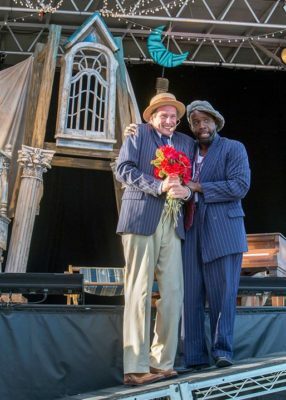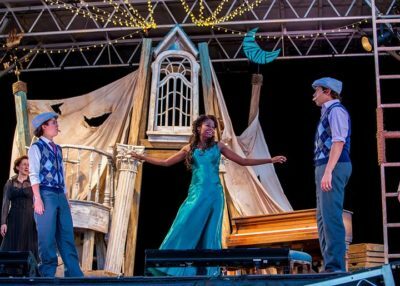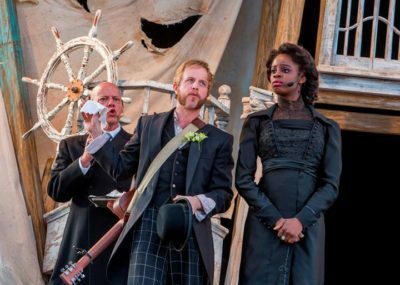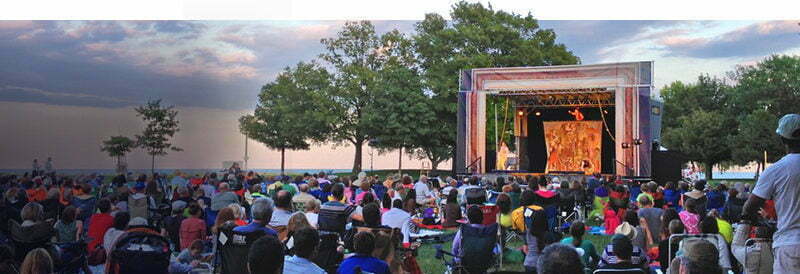Twelfth Night (Chicago Shakespeare in the Parks)

By William Shakespeare
Adapted and Directed by Kirsten Kelly
Produced by Chicago Shakespeare Theater
Summer Fun for the Family with Shakespeare
After a few changes to the script and re-staging for a park environment, Kirsten Kelly and Chicago Shakespeare have revived their short version of Twelfth Night for this summer’s city-sponsored Shakespeare in the Parks program. Featuring some of the same cast members as the production that played earlier this year in Chicago schools, Kelly’s Twelfth Night is endearing, funny, and light-hearted with just the right amount of intelligence. Having never before been particularly fond of this play before, I was impressed that Kelly’s directorial choices largely changed my opinion of it, and am happy to report that it has taken a worthy spot as the centerpiece of the Chicago Shakespeare 400 Festival.

The story begins with Viola (Andrea San Miguel) being shipwrecked in Illyria, but the beginning is where Kelly makes her first bold change. Instead of beginning with Duke Orsino (Neal Moeller) snapping at his servants or Viola’s maudlin complaining, the script is rearranged to begin with the shipwreck itself. This is much more interesting visually, allows us to see Viola and her twin brother, Sebastian (Nate Santana), expressing love for each other and displaying competence in a dangerous situation, and makes use of the more spacious possibilities of the outdoors (Scott Davis’s set design is a focal point, instead of a cage). The scene of Orsino pining for Lady Olivia (Nike Kadri) is inserted within the sea captain’s description of him, and is used to underline that Viola had some prior knowledge of Orisno, and maybe even a nascent crush, which goes a long way towards justifying her decision to disguise herself to get near him.
Kelly also has Viola and Sebastian speak to each other in Spanish, which happens briefly enough to not cause non-Spanish speakers to miss anything, but supplies their backstories with slightly more specificity. San Miguel’s performance is truly commendable. Her Viola is adventurous, optimistic, smart, and has a drag-king kind of masculinity. When Santana’s Sebastian returns to the play later on, we see that Viola modeled her Cesario persona on him, down to copying his clothes, and Kelly’s decision to make theirs the key relationship in the play supplies it with a heart that is much greater than the usual comedic trifle.

Orsino and Olivia are nuts, but Kelly runs with that instead of apologizing for it. Olivia has Malvolio (Jonathan Weir) deliver her a steady stream of handkerchiefs, which she disposes of in a great performance of grief for her own actually-dead brother, and Orsino rages at her rejection of his insincere courtly love. It’s an odd game Orsino and Olivia play, but with Viola and Sebastian’s fondness for excitement having been established, it makes sense for them to find the erratic nobles attractive. As for Malvolio, he deserves everything he gets. Weir’s interpretation of him is a hypocritically pious, finger-brandishing mixture of the grotesque and ridiculous. Ronald Conner’s Sir Toby is a jerk, too, but Dominic Conti’s Sir Andrew is merely boyish, not childish in a bad way, and Lydia Berger Gray’s Maria is as patient with Malvolio as is reasonable. (I should point out that Kelly eliminated some of Twelfth Night’s most kid-unfriendly lines in the interest of creating family entertainment.) Will Mobley is friendly, low-key Feste, and he leads the supporting cast through many musical numbers composed by sound designer Ethan Deppe.
 The music is, of course, a key part of Twelfth Night’s sense of playfulness, and allows audiences to accept the slightly exaggerated performances and contrivances of the plot. I had the pleasure of seeing this production at Navy Pier, where a few thousand people, most of whom probably had not known the play was happening until shortly beforehand, wandered over to the performance. Judging by how closely they paid attention, their applause when the couples finally get together, absence of walk-outs, and the number of people who wanted to meet the actors, I think it is safe to say that they had a very good time. It is ironic that Twelfth Night takes its name from its original production during the Christmas season, because it’s such fine material for a summer comedy (A Midsummer Night’s Dream is currently in production in Oak Brook). Chicagoans are very lucky to have a program that can deliver such a fine production to their neighborhoods and schools. Those who are unfamiliar with this play have an ideal opportunity to enjoy it for free, and those who know it well will be able to see it in a new light.
The music is, of course, a key part of Twelfth Night’s sense of playfulness, and allows audiences to accept the slightly exaggerated performances and contrivances of the plot. I had the pleasure of seeing this production at Navy Pier, where a few thousand people, most of whom probably had not known the play was happening until shortly beforehand, wandered over to the performance. Judging by how closely they paid attention, their applause when the couples finally get together, absence of walk-outs, and the number of people who wanted to meet the actors, I think it is safe to say that they had a very good time. It is ironic that Twelfth Night takes its name from its original production during the Christmas season, because it’s such fine material for a summer comedy (A Midsummer Night’s Dream is currently in production in Oak Brook). Chicagoans are very lucky to have a program that can deliver such a fine production to their neighborhoods and schools. Those who are unfamiliar with this play have an ideal opportunity to enjoy it for free, and those who know it well will be able to see it in a new light.
Highly Recommended
Jacob Davis
Reviewed July 14, 2016
Touring Chicago through August 14. For a complete schedule, see chicagoshakes.com. Running time is seventy-five minutes with no intermission, plus a ten minute pre-show. Chicago Shakespeare in the Parks is free.

